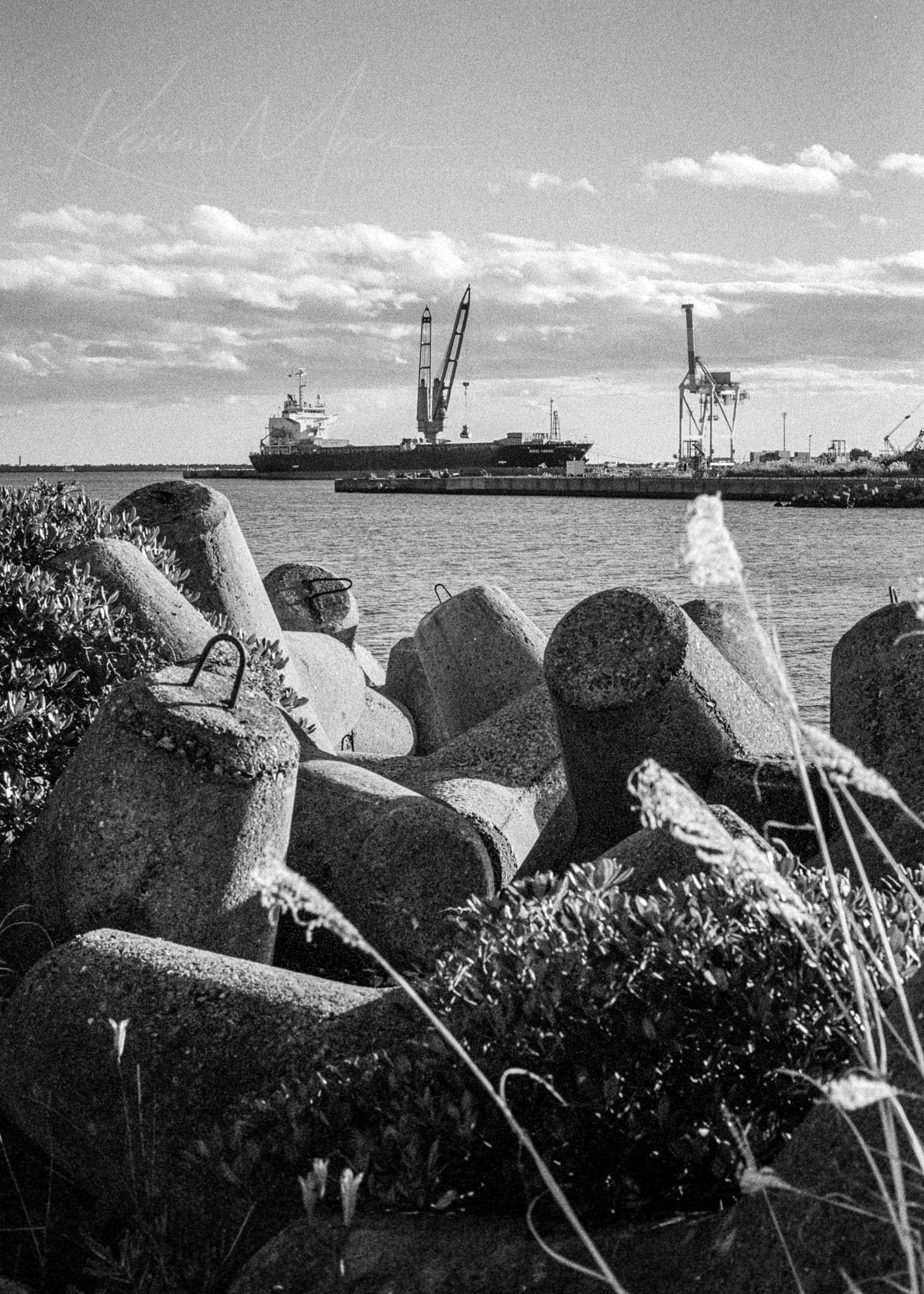
Nikon FM2n Monochrome Japan Photography: Capturing Timeless Elegance
Monochrome Japan Photography has a timeless allure, inviting viewers to immerse themselves in a world where light and shadow take center stage. With the Nikon FM2n as my trusted companion, I embarked on a journey through Iwaki City to capture its essence through the lens of black-and-white photography. This choice was not accidental; Monochrome Japan Photography, particularly with Ilford HP5 film, allows for a focus on textures, contrasts, and emotions that color photography sometimes overshadows. Each click of the Nikon FM2n told a story of the city’s subtle elegance and raw emotion.
The Art of Monochrome Photography
Monochrome Japan Photography transforms everyday scenes into extraordinary compositions. By removing color, it forces both the photographer and the viewer to focus on the fundamentals: light, shadow, texture, and composition. In a vibrant city like Iwaki, Monochrome Japan Photography highlights intricate details that might otherwise go unnoticed, such as the interplay of sunlight filtering through ancient architecture or the texture of stone walls weathered by time.
The Nikon FM2n, with its mechanical precision and robust build, is a perfect tool for this art form. Its fully manual controls give photographers the freedom to experiment with shutter speed, aperture, and ISO settings, ensuring every shot reflects the photographer’s vision. Paired with Ilford HP5 film, renowned for its high speed and ability to handle varying light conditions, the Nikon FM2n becomes a powerhouse for capturing dynamic urban landscapes and fleeting moments of life.
Exploring Iwaki City Through Shadows and Light
Iwaki City, located in Japan’s Fukushima Prefecture, is a harmonious blend of history and modernity. As I wandered its streets, I was captivated by the city’s unique character. Monochrome Japan Photography amplified my appreciation for Iwaki’s architectural heritage, from traditional wooden houses to contemporary urban designs. The absence of color brought attention to the textures of old wood, the sharp lines of modern buildings, and the organic patterns of nature integrated into the urban environment.
The historical landmarks of Iwaki City provided a treasure trove of photographic opportunities. The Shiramizu Amida Temple, a National Treasure of Japan, was particularly striking. Its serene gardens and intricate architectural details seemed to come alive in monochrome, with each frame capturing the timelessness of its design. Similarly, the Coal and Fossil Museum showcased an industrial past that lent itself beautifully to the stark contrasts and textures that black-and-white photography accentuates.
In addition to architecture, the natural beauty of Iwaki City added depth to my photographic journey. The Aquamarine Fukushima aquarium, with its flowing water exhibits and playful sea creatures, provided unique opportunities to explore reflections and movement in monochrome. Meanwhile, the coastlines and beaches of Iwaki, with their dramatic waves and rugged terrain, offered a stark contrast to the urban scenes, reminding me of the power of nature against the backdrop of human history.
Why the Nikon FM2n Shines in Monochrome Photography
The Nikon FM2n has earned its place as a classic in the world of photography. Its reliability and precision make it an indispensable tool for photographers seeking to master their craft. In Monochrome Japan Photography, where every detail matters, the Nikon FM2n delivers unparalleled sharpness and tonal range. Its compatibility with a wide array of lenses adds versatility, allowing photographers to adapt to diverse shooting conditions and creative visions.
Ilford HP5 film complements the Nikon FM2n perfectly. Known for its rich tonal gradation and ability to handle high contrast scenes, this film stock captures the subtle nuances of light and shadow that define Monochrome Japan Photography. Whether photographing a dimly lit alley or a sunlit park, Ilford HP5 ensures that every frame tells a vivid story, even without the presence of color. The combination of the FM2n and Ilford HP5 offers an unbeatable pairing for enthusiasts and professionals alike.
A Legacy of Excellence in the FM Series
The Nikon FM2n is part of a storied lineage of Nikon’s FM series of cameras. It succeeded the Nikon FM, a groundbreaking mechanical film camera, and improved upon its predecessor with enhanced durability and shutter speed precision. The FM2n was later followed by the Nikon FM3, which became Nikon’s final fully mechanical 35mm film camera. All versions of the FM series are celebrated for their exceptional build quality and reliability. These cameras, paired with an extensive range of superior Nikkor lenses, offer photographers superb value on today’s used market. Their affordability and performance make them an excellent choice for enthusiasts and professionals alike, continuing to hold a special place in the hearts of film photographers.
One of the FM2n’s greatest strengths is its ability to adapt to modern workflows despite being a mechanical film camera. With a sturdy, weather-resistant build, it’s a perfect companion for outdoor and travel photographers. Its longevity and availability in the secondhand market make it a practical and sentimental choice for those venturing into the world of film photography or revisiting it after years of digital exploration.
Emotional Depth in Monochrome Photography
Monochrome Japan Photography has a unique way of connecting with viewers on an emotional level. Without the distractions of color, the focus shifts entirely to the mood and atmosphere of the image. In Iwaki City, I found this emotional depth in the quiet moments: a lone cyclist navigating a cobblestone street, the soft ripple of water under a stone bridge, and the serene expressions of locals immersed in their daily routines.
The art of black-and-white photography requires patience and intentionality. With the Nikon FM2n, each shot became a mindful experience—a chance to slow down and truly observe the world around me. The deliberate choice to shoot in black and white was as much about capturing the city’s physical beauty as it was about preserving its intangible spirit. Each photograph became a dialogue between the scene and the viewer, inviting interpretations shaped by personal experiences and memories.
Custom Prints Available
If any of these images resonate with you, custom prints are available upon request. Whether you want a piece of Iwaki City’s charm for your home or a thoughtful gift for someone special, these prints capture the timeless appeal of Monochrome Japan Photography. Contact us here to inquire about print sizes, framing options, and shipping details. Each print is crafted with care to ensure it reflects the artistry and emotion of the original photograph.
The Legacy of Monochrome Japan Photography
Monochrome Japan Photography is more than a visual style; it’s a philosophy of storytelling. Through the Nikon FM2n, I discovered a medium that transcends time, capturing moments that feel both fleeting and eternal. The absence of color invites viewers to look deeper, uncovering layers of meaning and emotion that might otherwise remain hidden.
In Iwaki City, this approach allowed me to see the familiar with fresh eyes, transforming ordinary scenes into extraordinary narratives. Monochrome Japan Photography is not just about nostalgia; it’s about creating images that stand the test of time, inviting reflection and connection for years to come.
Through light and shadow, texture and tone, Monochrome Japan Photography continues to inspire creativity and evoke emotion. Whether you’re a seasoned photographer or someone who simply appreciates the beauty of black-and-white images, there’s something timeless and universal about this art form.
Monochrome Japan Photography invites us to slow down and savor the world in its simplest, most profound form. The Nikon FM2n and its legacy remind us of the enduring power of storytelling through a lens, proving that the magic of photography transcends technology and trends.
